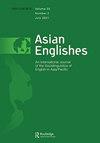Sociocultural profile of Koreanized English words
IF 1.8
Q1 LINGUISTICS
引用次数: 0
Abstract
ABSTRACT This article aims to illustrate how Koreanized English words capture the dynamic sociocultural and sociolinguistic façade of South Korea. The examples were taken from a few sociocultural contexts: education, relationships and eating culture. Korean speakers creatively navigate between two linguistic codes (Korean and English) to express novel meanings and describe sociocultural changes and innovations in Korean society. It is possible that such lexical items may not be intuitively recognized by English speakers outside Korea or those who are not familiar with the Korean lifestyle. However, by analyzing the trajectories of Koreanized English words we can gain insight into the correlation between Korean society and language use, and eventually better understand Korean use of the English language. This article also briefly discusses main word-formation trends in the creation of Koreanized English words.朝鲜化英语词汇的社会文化特征
摘要:本文旨在说明韩国化英语词汇是如何捕捉到韩国动态的社会文化和社会语言学面貌的。这些例子来自一些社会文化背景:教育、人际关系和饮食文化。讲韩语的人创造性地在两种语言代码(韩语和英语)之间导航,以表达新颖的含义,并描述韩国社会的社会文化变化和创新。这些词汇可能不会被韩国以外的英语使用者或不熟悉韩国生活方式的人直观地识别。然而,通过分析韩国化英语单词的轨迹,我们可以深入了解韩国社会与语言使用之间的相关性,并最终更好地理解韩国对英语的使用。本文还简要论述了韩国化英语词汇创作中的主要造词趋势。
本文章由计算机程序翻译,如有差异,请以英文原文为准。
求助全文
约1分钟内获得全文
求助全文
来源期刊

Asian Englishes
LINGUISTICS-
CiteScore
3.30
自引率
18.80%
发文量
34
期刊介绍:
Asian Englishes seeks to publish the best papers dealing with various issues involved in the diffusion of English and its diversification in Asia and the Pacific. It aims to promote better understanding of the nature of English and the role which it plays in the linguistic repertoire of those who live and work in Asia, both intra- and internationally, and in spoken and written form. The journal particularly highlights such themes as: 1.Varieties of English in Asia – Including their divergence & convergence (phonetics, phonology, prosody, vocabulary, syntax, semantics, pragmatics, discourse, rhetoric) 2.ELT and English proficiency testing vis-a-vis English variation and international use of English 3.English as a language of international and intercultural communication in Asia 4.English-language journalism, literature, and other media 5.Social roles and functions of English in Asian countries 6.Multicultural English and mutual intelligibility 7.Language policy and language planning 8.Impact of English on other Asian languages 9.English-knowing bi- and multilingualism 10.English-medium education 11.Relevance of new paradigms, such as English as a Lingua Franca, to Asian contexts. 12.The depth of penetration, use in various domains, and future direction of English in (the development of) Asian Societies.
 求助内容:
求助内容: 应助结果提醒方式:
应助结果提醒方式:


